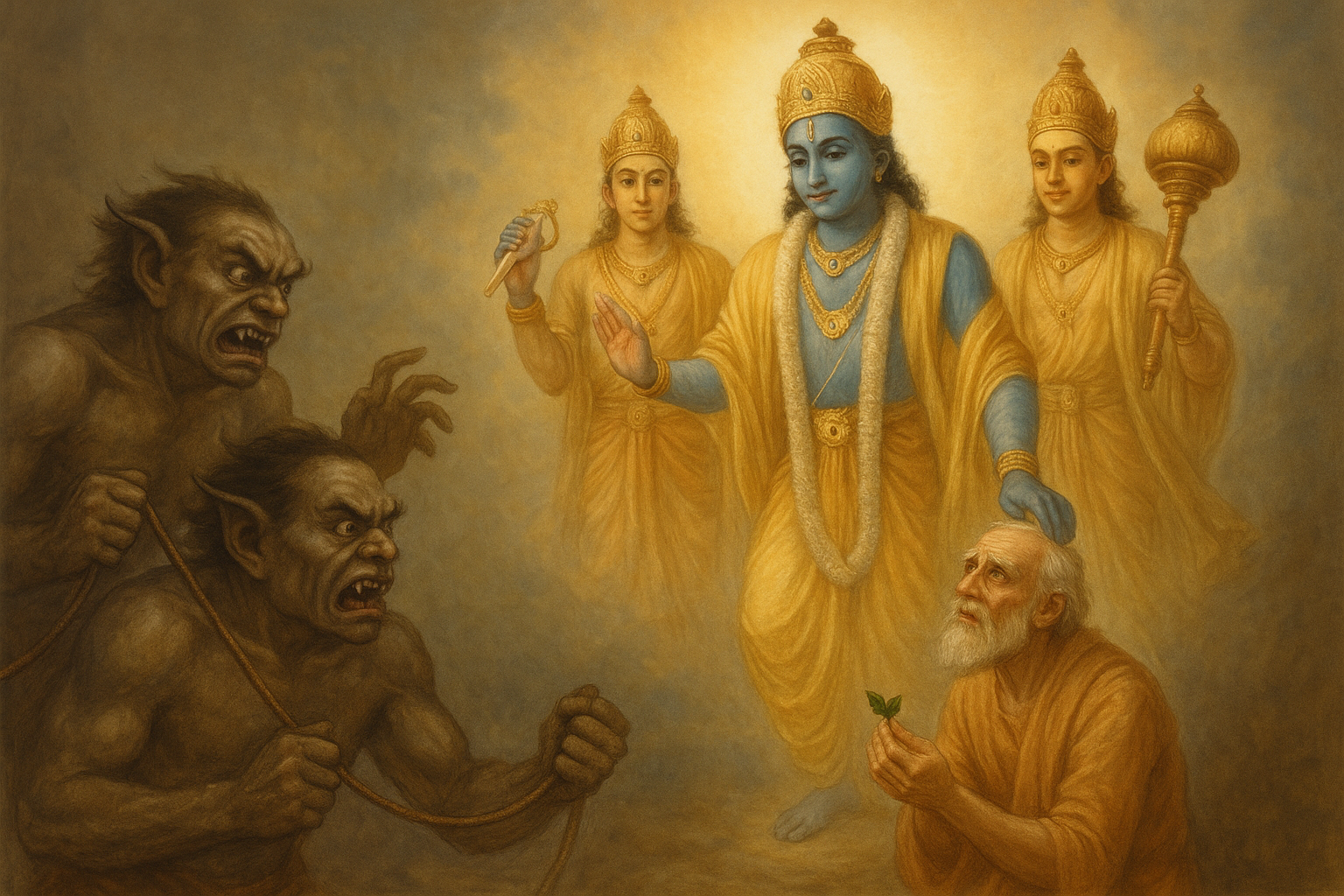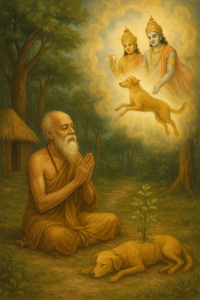The Miser’s Life of Hoarding
In a bustling town of traders and merchants, there lived a man of immense wealth—but his heart was dry and hard. He owned golden coins, bejeweled ornaments, fertile lands, and herds of cattle, yet his soul was consumed by avarice. Known throughout the city as a miser, he clutched every coin with suspicion and refused to part with even a grain of rice in charity.
He mocked religion and derided rituals. Temples, brāhmaṇas, and holy scriptures were objects of ridicule to him. He never once bowed his head before the deity of Lord Viṣṇu, nor did he speak the names of the Lord. For him, life was a vault, and wealth was god.
A Casual Act in the Garden
One day, while walking through his garden to inspect the mangoes and guards against thieves, he happened to notice a tulasī plant growing near a broken pot. Its fragrant leaves stirred a vague memory—something from his childhood, perhaps. He paused and muttered, “They say this is holy.”
With a smirk, he plucked a single leaf and mockingly tossed it upward, saying:
“O Viṣṇu, if You really are so great, take this!”
Then, with a shake of his head, he returned to his treasury room, never to think of the incident again.
Death and the Arrival of Yamadūtas
Time passed, as it always does, and the miser’s body grew frail. One day, he fell ill and never rose again. At the moment of death, his soul emerged from his body like a frightened bird. Instantly, the fierce Yamadūtas—servants of Yamarāja, lord of karma and death—appeared, ropes in hand, ready to drag him to the world of judgment.
They carried the heavy scrolls of his misdeeds—selfishness, neglect, arrogance, cruelty, and greed—written in the ink of his own actions.
The Appearance of the Viṣṇudūtas
Just as the Yamadūtas moved forward, brilliant beings of effulgent form—Viṣṇudūtas—descended from above, holding conch shells, lotuses, and maces. Their presence was like the cool shade of the moon after the burning sun.
With firm voices they proclaimed:
“This soul, though entangled in worldly attachments, once offered a tulasī leaf to the Supreme Lord. That act, even performed casually, has placed him under the shelter of bhakti.”
The Yamadūtas were astonished. “But he offered it mockingly! With no devotion, no faith!”
The Viṣṇudūtas replied:
“The Lord is bhāva-grahī—He accepts the feeling behind the act, even if imperfect. The very contact with tulasī is transformative. The Lord considers even a careless offering of tulasī as a seed of devotion, destined to sprout in time.”
Liberation and the Mercy of Tulasī
With no option but to yield, the Yamadūtas vanished, and the Viṣṇudūtas lovingly lifted the miser’s now-transformed soul. His face shone with peace, his form purified and adorned with divine brilliance. In the spiritual realm of Vaikuṇṭha, where service to the Lord is eternal and joyful, the soul was granted a new beginning—a life of spiritual awakening, devotion, and freedom from material bondage.
Lessons from the Story
- Even a single act of connection with the sacred can transform a soul.
A tulasī leaf offered to Viṣṇu—even unintentionally—can spark the journey toward liberation. - The Lord accepts even the smallest offerings if they are connected to Him.
As long as there is even a hint of sincerity or remembrance, He embraces it fully. - Sacred symbols like tulasī are surcharged with divine potency.
Tulasī-devī is so dear to the Lord that contact with her, even in jest, can uplift the soul.
Scriptural Support
tulasī-dala-mātreṇa jalasya culukena vā
vikrīṇīte svam ātmānam bhaktebhyo bhakta-vatsalaḥ“The Lord, who is extremely affectionate toward His devotees, sells Himself to them for even a single tulasī leaf or a sip of water offered with devotion.”
(Padma Purāṇa)
Origin of the Story: Padma Purāṇa – Glories of Tulasī-devī

